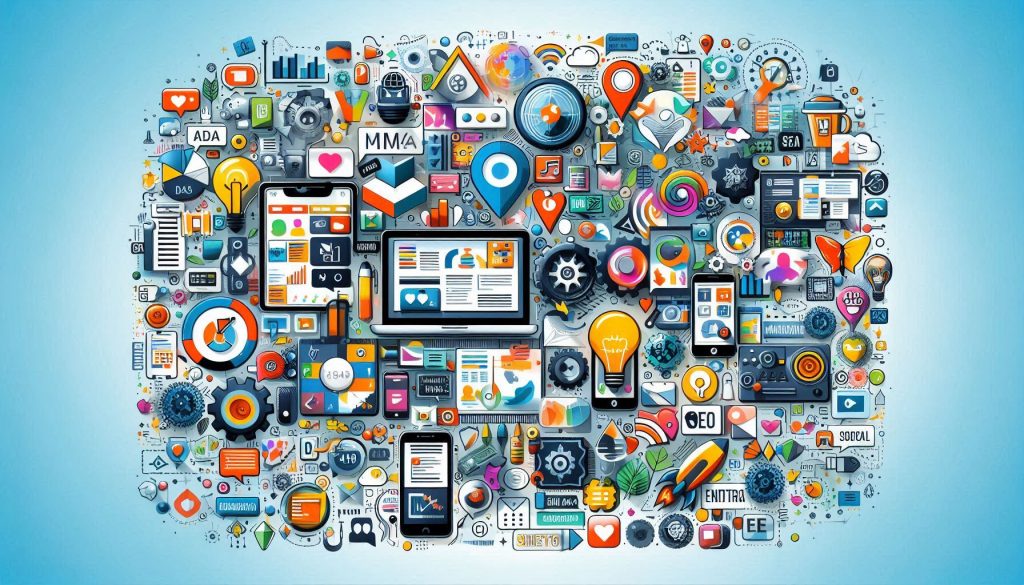Digital marketing automation streamlines repetitive tasks to improve efficiency and target audience engagement effectively. By automating processes such as email campaigns and social media posting, businesses can save time and reach their audience more strategically.
Digital marketing automation allows companies to personalize their marketing efforts, analyze data in real-time, and optimize campaigns for better results. This technology helps businesses stay competitive in the digital landscape by enhancing their marketing strategies and improving overall performance. With the right tools and strategies in place, digital marketing automation can drive growth and success for businesses of all sizes.
The Power Of Digital Marketing Automation
Enhancing Marketing Efficiency
With digital marketing automation, businesses can streamline their marketing processes, saving time and resources. Automated workflows allow for scheduling and deploying marketing campaigns without manual intervention, ensuring consistent and timely delivery of content to the target audience. By automating repetitive tasks, such as email marketing, social media posting, and lead nurturing, marketing teams can focus on more strategic initiatives to drive business growth.
Improving Customer Targeting
Digital marketing automation tools enable precise segmentation of the audience based on demographics, behavior, and interests. By utilizing data-driven insights, businesses can create personalized and relevant content for each segment, leading to higher engagement and conversion rates. Through automation, marketers can deliver the right message to the right audience at the right time, enhancing the overall effectiveness of their marketing efforts.
Benefits Of Implementing Automation
Discover the advantages of incorporating digital marketing automation for increased efficiency, streamlined processes, and targeted audience engagement. Automation enhances productivity, optimizes campaigns, and drives better ROI in the competitive online landscape.
Benefits of Implementing Automation Digital marketing automation offers a range of benefits that can significantly enhance the efficiency and effectiveness of your marketing efforts. By leveraging automation tools, businesses can experience increased ROI, streamlined campaign management, and improved customer engagement. Let’s delve into the specific advantages of implementing automation. Increased ROI Automating various marketing processes can lead to a substantial increase in ROI.
By automating repetitive tasks, such as email marketing, social media posting, and lead nurturing, marketers can save time and resources, allowing them to focus on high-value activities. This can lead to a more efficient use of resources and ultimately result in a higher return on investment. Streamlined Campaign Management One of the key benefits of digital marketing automation is the ability to streamline campaign management.
Through the use of automation, marketers can easily create, launch, and monitor campaigns across multiple channels from a single platform. This not only saves time but also ensures that all marketing efforts are cohesive and consistent, leading to a more impactful overall strategy.
Additionally, automation tools provide valuable insights and analytics that can help marketers optimize their campaigns in real-time. This data-driven approach allows for quick adjustments and improvements, leading to more effective and successful marketing campaigns. In summary, the implementation of digital marketing automation can have a profound impact on a business’s marketing efforts. From increased ROI to streamlined campaign management, the benefits of automation are clear. By leveraging these tools, businesses can enhance their marketing strategies and achieve greater success in today’s digital landscape.
Key Features To Look For
Digital marketing automation has become an essential tool for businesses looking to streamline their marketing efforts and improve efficiency. When selecting a digital marketing automation platform, it’s crucial to consider the key features that will best suit your organization’s needs. Here are some important features to look for:
Personalization Capabilities
Personalization is a crucial aspect of modern marketing, allowing businesses to deliver tailored content and messages to their audience. Look for a digital marketing automation platform that offers advanced personalization capabilities, such as the ability to segment audiences based on behavior, demographics, and preferences. The platform should also support dynamic content that can be personalized based on individual user data, ensuring that your marketing efforts resonate with your audience on a personal level.
Integration With CRM Systems
Integration with CRM systems is essential for a seamless flow of data and insights across your marketing and sales teams. A robust digital marketing automation platform should seamlessly integrate with popular CRM systems such as Salesforce, HubSpot, or Microsoft Dynamics, allowing you to leverage customer data to create targeted campaigns and personalized experiences. This integration ensures that your marketing efforts are aligned with your sales objectives, leading to improved lead management and conversion rates.
Best Practices For Successful Implementation
Digital marketing automation has revolutionized the way businesses engage with their audience, streamline workflows, and drive growth. However, successful implementation of digital marketing automation requires adherence to best practices to ensure optimal results. Here are the essential best practices for successful implementation:
Setting Clear Objectives
Before implementing digital marketing automation, it’s crucial to establish clear objectives that align with your overall business goals. Define specific key performance indicators (KPIs) such as lead generation, conversion rates, or customer retention that you aim to improve through automation. These objectives will serve as a guide for selecting the right automation tools and crafting effective strategies.
Continuous Monitoring and Optimization
Continuous monitoring and optimization play a pivotal role in the success of digital marketing automation. Regularly evaluate the performance of your automated campaigns and analyze the data to identify areas for improvement. Leverage A/B testing and data-driven insights to optimize your automation workflows for better engagement and conversion rates. Implement changes based on the findings to ensure that your automated processes remain effective and efficient.
Case Studies Of Successful Automation
E-commerce Industry Example
Implementing digital marketing automation in the e-commerce sector has led to significant revenue growth. By leveraging automated email campaigns, personalized product recommendations, and dynamic pricing strategies, online retailers have seen a surge in customer engagement and sales.
B2B Marketing Success Story
One notable case study in B2B marketing showcases how a software company achieved a 30% increase in lead generation through automation. By streamlining lead scoring, nurturing processes, and integrating CRM systems, they were able to deliver highly targeted content and achieve a higher conversion rate.
Overcoming Challenges In Adoption
Facing obstacles in adoption, utilizing digital marketing automation streamlines processes, boosts efficiency, and enhances customer engagement, paving the way for successful campaigns and increased conversions. By automating tasks, businesses can overcome challenges and achieve targeted results in the dynamic digital landscape.
Employee Training and Buy-in
Employee training and buy-in are crucial for the successful adoption of digital marketing automation. Staff must be trained to understand the benefits of automation and how it can improve their job functions. This training should be ongoing to keep staff up to date with any changes or updates in the system. It’s also important to get buy-in from staff. This means they should be involved in the decision-making process and their input should be valued. They should understand how automation will benefit the company and how it will make their jobs easier.
Data Privacy and Compliance
Data privacy and compliance is another challenge companies face when adopting digital marketing automation. Companies must ensure they are collecting, storing, and using customer data in compliance with data privacy regulations. To overcome this challenge, companies should ensure they have a clear understanding of the data privacy regulations in their region. They should also ensure they have the necessary tools and processes in place to protect customer data. This includes having a data protection officer and implementing security measures such as encryption and access controls. In conclusion, overcoming challenges in adoption of digital marketing automation requires a clear understanding of the benefits of automation, ongoing staff training, and buy-in, as well as compliance with data privacy regulations. By addressing these challenges, companies can successfully adopt digital marketing automation and improve their marketing efficiency and effectiveness.
Future Trends In Marketing Automation
As technology continues to advance, the future of marketing automation is set to be shaped by several key trends. These trends, including AI and machine learning integration, and cross-channel automation, will significantly impact the way businesses engage with their audiences and streamline their marketing efforts.
AI and Machine Learning Integration
The integration of AI and machine learning in marketing automation is poised to revolutionize the industry. Through the use of sophisticated algorithms, AI can analyze vast amounts of data to identify patterns and trends, enabling marketers to personalize their campaigns and deliver targeted content to their audience with unprecedented precision.
Cross-Channel Automation
Cross-channel automation is another future trend that will redefine marketing strategies. By utilizing advanced automation tools, businesses can seamlessly coordinate their marketing efforts across various channels, ensuring a cohesive and consistent brand experience for their customers. This approach enables companies to engage with their audience at every touchpoint, maximizing the impact of their marketing initiatives.
Conclusion and Recommendations
For digital marketing automation, the conclusion highlights the efficiency gained through streamlined processes. Recommendations include leveraging AI for personalized campaigns and continuous optimization for better ROI. Emphasizing data-driven decision-making ensures success in the evolving digital landscape.
Embracing Automation For Competitive Edge
Automation in digital marketing is essential for staying ahead in today’s competitive landscape. By leveraging automation tools, businesses can streamline processes and optimize efficiency.
Implementing automation allows for personalized and targeted marketing strategies, enhancing customer engagement and driving conversions.
Continuous Innovation For Sustained Growth
Continuous innovation is key to achieving sustained growth in the digital marketing realm. Businesses need to embrace new technologies and trends to remain relevant and competitive.
Adopting a culture of innovation fosters creativity and adaptability, enabling businesses to stay ahead of the curve.
Frequently Asked Questions
What Is Automated Digital Marketing?
Automated digital marketing uses software to streamline and automate repetitive tasks, such as email marketing and social media posting. It helps businesses save time and resources while delivering targeted and personalized marketing campaigns. This approach enhances efficiency and allows for better customer engagement.
How Do I Automate My Digital Marketing Agency?
Automating your digital marketing agency can be achieved by using tools and software that can streamline your processes. You can automate your social media scheduling, email marketing, lead generation and analytics reporting. This can save you time, increase efficiency and improve the overall performance of your agency.
Difference Between Marketing Automation and Digital Marketing?
Marketing automation automates repetitive tasks, while digital marketing encompasses all online marketing efforts.
How To Automate Online Marketing?
To automate online marketing, use tools like email autoresponders, social media schedulers, and ad management platforms. Set up automated workflows for lead nurturing and customer follow-ups. Analyze data to refine strategies and optimize performance. Regularly review and update automation processes for maximum effectiveness.
Conclusion
As businesses embrace digital marketing automation, they gain efficiency and boost engagement. Harnessing the power of automation tools streamlines processes and enhances customer experiences. By utilizing data-driven strategies, companies can stay ahead in the competitive online landscape. Embracing automation is key to success in the digital marketing realm.

